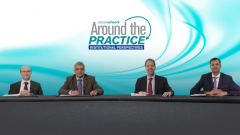
Role for Transplantation and Maintenance Therapy in NDMM
Considerations for assessing eligibility of patients for transplantation for NDMM and how maintenance therapy may be initiated in the post-transplant setting.
Episodes in this series

Transcript:
Shaji Kumar, MD: In this patient, what level of response would you be happy with, or would you rather see the renal function improve irrespective of the response?
Morie Gertz, MD: Her light chain is 73 mg/dL, and if that had occurred with creatinine that was falling to 2 or 1 mg/dL, I would be head over heels. However, her creatinine isn’t budging, and that may be because during her months of fatigue and not feeling well, she developed irreversible renal failure, glomerular fibrosis, and that may not be reversible. With her creatinine where it is and not knowing how much is reversible, a light chain of 73 mg/dL, which is a greater than 50% reduction, isn’t even close to enough. It has to be VGPR [very good partial response] or better. There has to be a 90% reduction; that’s an obligation to the patient to see if we can recover any of that renal function.
Shaji Kumar, MD: David, Morie talked about taking this patient to transplant. What do you consider, especially in the setting of renal insufficiency, when you take someone to transplant? Are the results the same? Is there a specific level of renal response you want to see before you take them to transplant?
David Dingli, MD: There are various aspects to that question. We know that patients with renal failure can be transplanted, and outcomes can be quite satisfactory. The problem with this patient would be that if kidney function is not stable and she is getting by without needing dialysis, then there is a substantial risk that the patient will end up on dialysis, and the patient is to understand and accept that risk. We typically say that the risk of going to dialysis in an average patient with myeloma is less than 5%; this patient likely has a 15% or higher risk that she would need dialysis peritransplant, and perhaps long term. The deeper the response this patient gets, the better the chance is that you could get partial salvage of kidney function. However, as Morie said, it’s quite possible that this patient has irreversible kidney scarring, and then, no matter how well we control the plasma cell clone, her kidney function will not improve.
Shaji Kumar, MD: Morie, if the kidney function doesn’t improve substantially and you take the patient to transplant, what would you consider for maintenance? Would you consider dose-reduced len [lenalidomide] or would you consider a proteasome inhibitor?
Morie Gertz, MD: To comment on our own experience, we are 3400 transplants in and 5% of these patients come to transplant with fixed renal insufficiency. What we’ve found is that although the overall survival of patients with elevated creatinine levels is shorter than the non–renal failure population, their progression-free survival 1 [time to first relapse] isn’t any different. We can do well with those patients. I am thinking by next Friday, if the patient isn’t at VGPR, then it is time for lenalidomide. I am not going to be stingy with the dose. I will manage the myelosuppression. What the maintenance will be will depend on how she tolerates it during induction. If lenalidomide actually works, and it would obviously have to be added with a second-generation proteasome inhibitor, then I think it would make a great maintenance choice. But I don’t have to make the decision today. I can give her the IMiD [immunomodulatory drug] with induction and then figure out when I am post-transplant what my best bet is. I think one of the mistakes we make is trying to tell patients what we are going to be doing in 6 months when, while it is customary what we do, there are too many balls in the air to prespecify what I am going to do post-transplant.
Transcript edited for clarity.
Newsletter
Stay up to date on recent advances in the multidisciplinary approach to cancer.






































